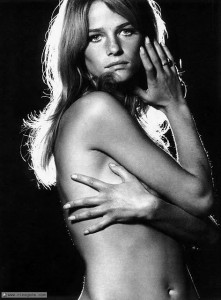Farewell, My Lovely/1975/Embassy Pictures/97 min.
If you get a chuckle out of Patty and Selma Bouvier of “The Simpsons,” the Laramie-puffing, big-haired sisters with terrible taste in men, you’ll enjoy the raspy-voiced alcoholic widow Jessie Florian of 1975’s “Farewell, My Lovely.” Actress Sylvia Miles earned an Oscar nomination for her portrayal of this sad and seedy lady.
Miles is just one of many superb performers in this movie, notably Robert Mitchum as private investigator Philip Marlowe and Charlotte Rampling, a judge’s wife, bored to tears in their May/December relationship.
Having starred in many stand-out noirs as a younger actor (“Out of the Past,” “Angel Face” are two of the finest noirs ever made), Mitchum once again lends his sexy, sleepy indolence to the part of a burned-out and baleful detective at the end of his career.
Directed by Dick Richards and written by David Zelag Goodman, “Farewell” is based on Raymond Chandler’s novel of the same name, published in 1940. Director Edward Dmytryk brought the book to the screen in 1944 as “Murder, My Sweet,” a seminal noir starring Dick Powell and Claire Trevor. (The title was changed because Powell, a song and dance man, was playing off-type and studio execs didn’t want audiences to think it was a musical. It was also filmed in 1942 as “The Falcon Takes Over.”)
“Murder My Sweet,” with its sordid criminals and Expressionist sensibility, was a triumph for Dmytryk and his team. Even so, the film only skimmed the surface of Chandler’s darkness; by 1975, topics like prostitution and racism, in addition to garden-variety crime, could be addressed on the big screen.
The movie opens with David Shire’s luscious score and shots of 1940s Los Angeles at night, bathed in neon light. There we see Mitchum in a dumpy hotel room (you were expecting the Four Seasons?) reflecting over the past few months — rotten weather and rubbing elbows with lowlifes and deadbeats. Weary of “ducking police” and apparently needing to confess, he calls Det. Lt. Nulty (John Ireland), who agrees to come to the hotel. While waiting for Nulty to arrive, Marlowe begins a second flashback, in which Nulty is a participant, and we get to the meat of the story.
On a boring bread-and-butter case, Marlowe bumps into Moose Malloy (Jack O’Halloran), long on brawn, short on brains and just out of jail. Moose wants Marlowe to find his girlfriend, a one-time showgirl named Velma, whom he describes as “cute as lace pants.”
The pair head to Florian’s nightclub in search of clues. Nothing turns up, though, and the frustrated Malloy kills a guy with his bare hands. Back to the slammer for the ungentle giant? Well, since the victim is black, the cops aren’t going to do much about it. Next stop for Marlowe: A visit to Jessie Florian’s, with a big bottle of cheap booze in hand. Upon seeing Marlowe, Jessie dons her best bathrobe and turns on the charm.
Meanwhile, a very different client, the posh and effeminate Lindsay Marriott (John O’Leary) hires Marlowe to be a bodyguard during an attempt to retrieve a stolen jade necklace. You’d think the fact that Marriott shows up in a disco suit much like John Travolta’s in “Saturday Night Fever” might put Marlowe off. Instead, the job opens the door to a circle of unsavory mover/shaker types.
There’s elderly and insipid Judge Baxter Wilson Grayle (a cameo role for Jim Thompson, a famed noir writer of the ’50s); his much younger wife Helen (Charlotte Rampling), ravishing, shrewd, brash and, like Jesse Florian, very fond of strong cocktails; the mannish madame of a high-class whorehouse Frances Amthor (Kate Murtagh); and the suave but slippery Laird Brunette (Anthony Zerbe). As Brunette puts it: “All I do is run towns, elect judges and mayors, corrupt police, peddle dope, ice old ladies with pearls.” [Read more…]











From FNB readers